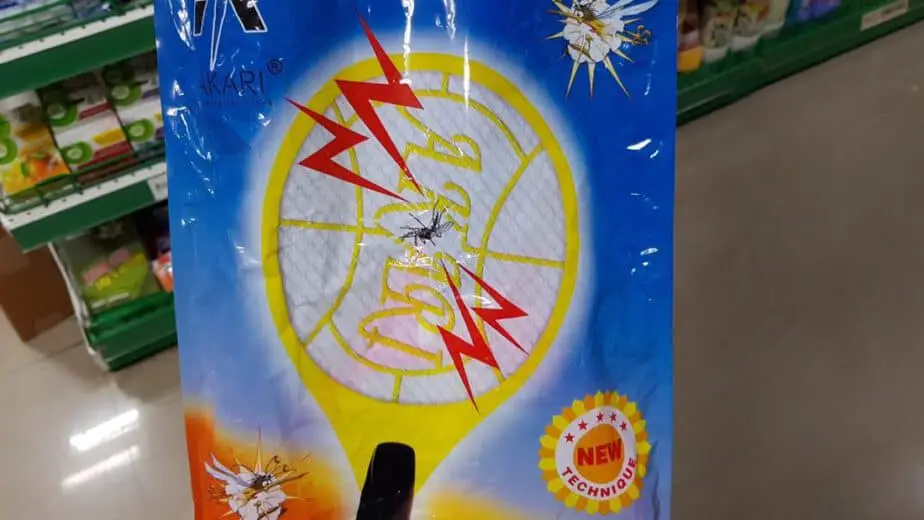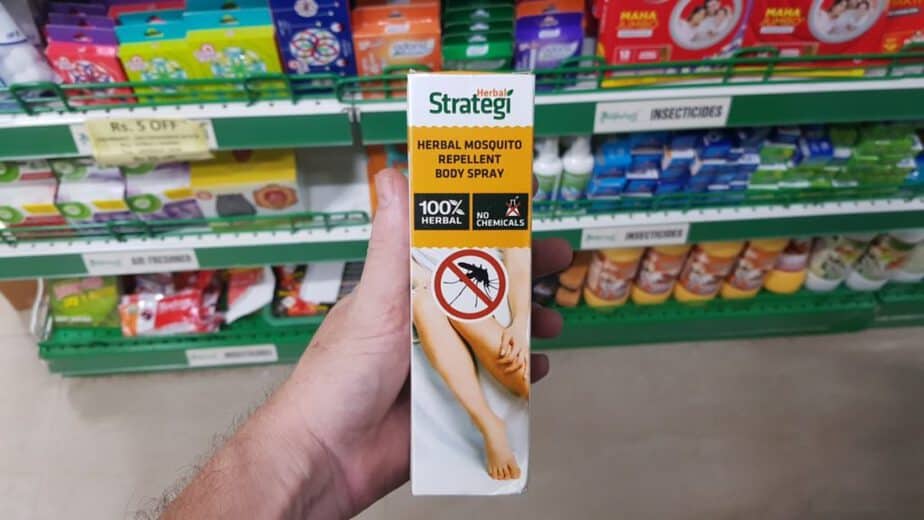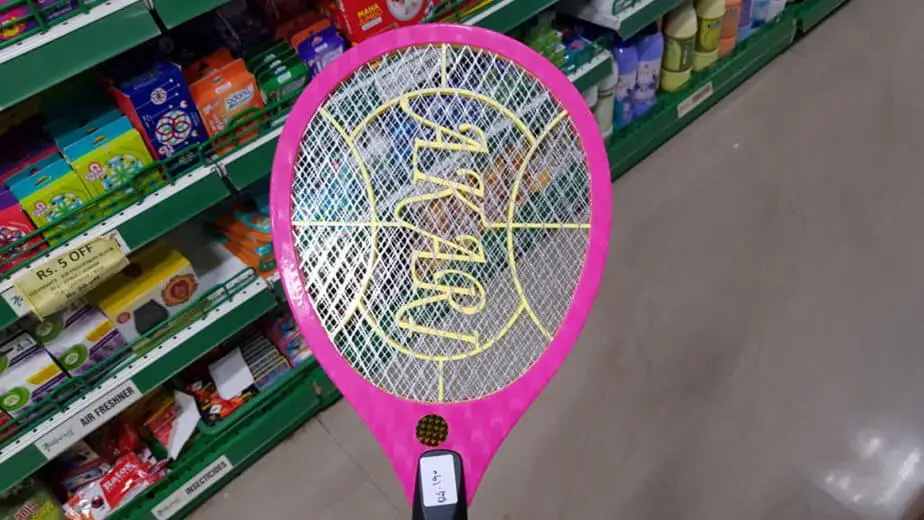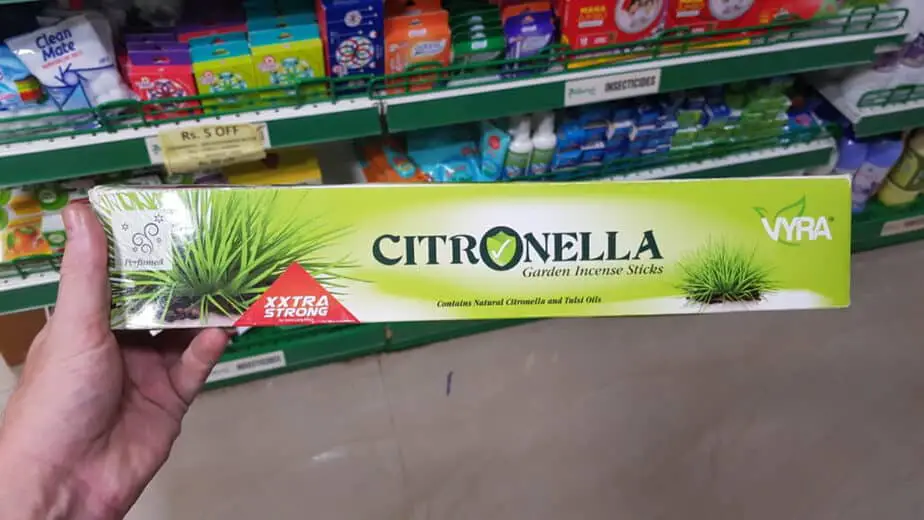Whzzzzzz Whzzzz Whzzzzzz. Yep, that’s the dreaded sound of a mosquito in your bedroom. I can think of some terrible tortures but this has to be one of the worst 😱
How can you avoid mosquito bites on your India trip? Use 20-30% DEET repellent on your skin and clothes, and use a mosquito net at night.
Below I have other tips about what to do and what NOT to do…
I have rented a pretty nice place in India. It’s on the second floor with a big porch. My office has big windows overlooking the local holy hill. It’s pretty quiet at night since I’m a little way out of town.
In the winter, I have my windows open to let in the cool breeze. Being from the Midwest in the US, I like to sleep when it’s chilly. The winter in South India has a few rare months where I can sleep with the windows open because it’s not too hot.
However, even though I have screens, most mornings I’ll wake up to the dreaded Whzzzzz of a buzzing mosquito in my bedroom. Or worse, a mosquito that is full of blood. Or a bunch of them.
How are they getting in through a screen? And more importantly, how can you avoid getting mosquito bites if you are traveling in India?
Disclaimer: I’m not a medical professional and the tips below are what I have learned from my personal experience in India. Please do everything you think is best for you and helps you sleep soundly at night. If you want more information, please consult your doctor.
How to Avoid Mosquito Bites in India:

Here are the preventative measures I’ve taken, I hope they help you enjoy this beautiful country.
1) Get a DEET Spray
These four sprays were found to be the best by Consumer Reports. They will provide protection for up to 6 hours.
Deet is the most effective and widely available repellent that actually works to keep mosquitos off. Lemon Eucalyptus and Picaridin can work as well.
- Total Home Woodland Scent Insect Repellent with 30% DEET.
- OFF! Deep Woods Insect Repellent VIII Dry with 25% DEET. You can check the price on Amazon here.
- Repel Plant-Based Lemon Eucalyptus
- Sawyer Premium Insect Repellent with 20% picaridin. You can check the price on Amazon here.
Important Traveler Note: According to the TSA, you can bring aerosol cans on the plane if they are smaller than 3.4 ounces.
Ingredients: DEET
Getting the right spray is one of the best ways to prevent mosquitos. DEET is the ingredient in many brands of repellent like OFF! Deep Woods. It’s a colorless oily liquid with a mild odor and it has been proven effective to keep mosquitos away.
How much DEET do you need?
Consumer Reports found that more DEET is NOT necessarily better. Products with as much as 25 to 30 percent can provide effective protection. Higher concentrations of DEET could pose a higher risk for skin irritation or maybe seizures.
TIP: Deet products with 15 or 20 percent were NOT always effective. Products with 7 to 10% DEET did NOT work well.
WARNING: Do NOT use DEET Repellent on babies younger than 2 months old.
Ingredients: Picaridin
Picaridin is a synthetic repellent made from a compound that naturally occurs in black pepper plants. It also can prevent mosquitos.
TIP: 20% picaridin sprays were found to be the most effective.
The spray was found to be better than the creams.
Is Picaridin safe? It has been found to be safe even for use with infants. However it can irritate your skin and eyes, so use your own discretion. I know that I have sensitive skin so will test a product on a small bit of my skin before using it.
Ingredients: Oil of Lemon Eucalyptus
This is a naturally occurring compound that is refined and extracted from the gum of eucalyptus trees. It can also be synthetically made in a lab though.
The best spray is a 30% oil of lemon eucalyptus that can hold off mosquitos for at least 7 hours.
This product is pretty safe. It is NOT recommended for children younger than 3 though. It can also cause temporary eye injury.
2) Apply Repellent Correctly
- Apply repellent to exposed skin
- Apply repellent to clothing
- Do NOT apply to skin that is covered in clothing
- More is not better. Use just enough to cover your skin.
- Do NOT use with cuts, wounds or if you have a rash.
- Do NOT spray on your face. Spray on your hands, then apply to your face avoiding the eyes and mouth. Only use a little around your ears.
- Do NOT let young kids apply it themselves. Put it on your hands and then apply for them.
- Do NOT put any on a child’s hands. They may rub their eyes or put it in their mouth.
- Do NOT spray near food. Wash your hands before eating or drinking.
- Wash the spray off at the end of the day.
- Wash treated clothing before wearing again.
- Some sprays damage leather or vinyl or stained synthetic fabrics.
- Do NOT spray on before going to bed
3) Do NOT Trust ‘Natural’ Sprays

Lemon Eucalyptus is the most natural effective spray.
Citronella, peppermint, clove, cedar, geranium, lemongrass, rosemary, and other sprays that are advertised as being ‘natural’ were NOT effective to repel mosquitos.
Many of them failed within a half-hour in Consumer Reports testing.
4) Sprays are Better than Lotion or Wipes
The form of the repellent mattered. The sprays did better than creams, lotions or wipes.
5) Do NOT Trust Sunblock + Insect Repellent Creams
Sometimes a brand will blend sunblock with insect repellent and these have NOT been proven to be effective.
6) Mosquito Repellent Bracelets Do NOT Work
These products to be worn on your wrist are usually infused with citronella or peppermint oil or more general botanical extracts.
The scents they release are just not strong enough to repel mosquitos though.
One study did find some protection but it was only for a few inches on each side of the bracelet. Mosquito repellent bracelets will NOT protect the rest of your body.
7) Mosquito Patches Do NOT Work
Similar to bracelets, these are like nicotine patches to prevent mosquitos. They release lemon eucalyptus, citronella, or peppermint oil.
But they are NOT strong enough to offer full-body protection. Maybe you could use a patch for kids as an added bit of protection, especially for kids who you may have a hard time applying the sprays onto.
8) Use a Mosquito Net
For protection at night, mosquito nets are your best option.
You might find these in some hotel rooms and my friends, who’ve lived here for years, swear by them.
I like the ones you can hang from the ceiling, although my ceilings are too high. I have a brand with metal wires that I have attached to my bed.
Mosquitos can somehow find their way into mosquito nets as well, so before bed, I need to carefully look through my net to make sure there are no little buggers laying an ambush for me.
Having a great mosquito net has taken a big weight off my mind since I do NOT like waking up to the buzzing, as I said before.
You can also find Permethrin treated nets. These are difficult to find in India and if you get a good net, that is all you need.
For travelers: Most hotels and hostels will offer a mosquito net. If you need one, you can buy it locally. It would be a difficult thing to carry with you since accommodations can vary and you may not be able to hang the net. You also may rip your net as you travel.
9) Wear Long Sleeves and Long Pants
Indian men wear long sleeves and long pants all seasons, and where I live it is regularly over 105 F in the summer. Sometimes higher.
In the summer, I did NOT notice many mosquitos though.
I have noticed a lot of mosquitos in the pre-winter and winter. We are entering the monsoon season now and I can tell there are more mosquitos as it starts to rain more.
Wearing long sleeves and long pants is one method of prevention.
If you are traveling, this may be difficult, since it will likely be warm and you will be sweating. If you can overcome it, then it may help prevent mosquito bites.
10) Mosquito Resistant Clothing is sort of Effective
REI, L.L. Bean, Ex-Officio and Insect Shield make clothing that repels mosquitos with Permethrin-treated clothing.
Permethrin is an insecticide that may help protect you against mosquitos. It is a synthetic version of a compound that is made by a chrysanthemum flower. It doesn’t stop bites by preventing them from landing, instead, it kills them if they land.
Permethrin is used in sprays for homes and in public spaces.
WARNING: Permethrin is probably a human carcinogen, so this comes with heavy risk. It has also been linked to Parkinson’s Disease.
The clothing is supposedly safe for humans, including pregnant women, since it won’t soak into your skin.
The shirts do kill mosquitos but they may be too slow to prevent you from getting bitten.
It is better to wear a regular shirt and spray a DEET repellent on to prevent mosquito bites. You may be able to wear this shirt and a DEET repellent for added protection if you are okay with the health risk and want extra protection.
TIP: If you are a digital nomad, this shirt may actually be helpful though. If you are working in an office, it will kill the mosquitos thereby reducing the chance you’ll get further bites.
11) Dietary Supplements are NOT Effective at Preventing Mosquito Bites
There is anecdotal evidence that suggests some dietary supplements could prevent mosquito bites. That is not true. Here are the common supplements people think of:
- Garlic: Studies show it does not prevent mosquitos from biting. It also doesn’t work if you squeeze it on your skin (although it does make you smell delicious. I love garlic!)
- Vitamin B: Studies have shown this vitamin works no better than a placebo to prevent mosquito bites.
- Bananas: Some people think they may prevent them. Others think they may attract them. More studies show they eating bananas could attract mosquitoes.
12) Drinking Gin and Tonics will NOT Prevent Mosquito Bites
If you were an old British guy living in India way back in the day, you may sip on a G&T and laugh with your chums about how this delicious beverage can prevent mosquito bites.
The reason they thought this was: Tonic has quinine in it.
Quinine comes from the bark of a cinchona tree and was a treatment for malaria in the 1960s.
Unfortunately, while quinine will kill parasites, it does NOT prevent mosquito bites. There is also hardly any quinine in tonic water these days.
Alcohol actually might make you MORE ATTRACTIVE to mosquitoes. A study found that drinking a few glasses of beer would attract more mosquitoes than if you just drank water.
Hey if you want a gin and tonic, enjoy yourself! It’d be delicious on a hot Indian day. However, it will NOT keep the mosquitoes away.
If You’re Staying in an Area for a while, Try These Things to Prevent Mosquitos:

13) The Mosquito Bat is Effective and Fun
Ever want to electrocute the daylights out of that annoying mosquito buzzing around your bedroom? If not, you may be more Zen than me.
I love killing the little buggers and this tool is one of the best ways to do so, and it’s fun.
It’s like having one of those bug zappers people put on their patio, in your hand. Swing it towards the tiny winged invader and POP! they are no more.
You can pick one of these up for like $8 at a tourist grocery shop. Less if you head to shop where the local’s shop.
14) Mosquito Repellent Incense Sticks do NOT work

You can smell some almost delicious incense here in India as you walk down the street. Of course, it makes sense then that you can also buy some incense that claims to keep mosquitos at bay.
I have some from Strategi called Mostick. It’s an herbal brand and made with:
- 15% Cymbopogon citriatus Bhutika Oil
- 14% Azardirachta Indica Nimba Oil
- 9% Eucalyptus globus Tailaparna Oil
- 7% Cymbopogon martini Rohisha Oil
***Cymbopogon is related to lemongrass
The smell is OKAY, a blend of smokey and citrus. Not as amazing as some of my other scents, but it’s pleasant.
In general, any repellent that is NOT applied to your skin is less effective than one that is applied.
15) Citronella Candles are NOT Effective
Citronella is an oil from the stems and leaves of lemongrass (Cymbopogon). Apparently, mosquitos are not a big fan of the citrus scent.
There was another study, published in the Journal of Insect Science of 11 types of repellents, including citronella candles.
However, the citronella candles were proven to be ineffective at keeping the blood-thirsty buggers away.
16) Sonic High-Frequency Repellers are NOT Effective
It’s a simple yet flawed idea. Broadcast the high-frequency 15kHz ultrasonic sounds to keep mosquitos away. The manufacturers claim it makes the pests feel “uncomfortable” so they will leave your house.
It’s the opposite of a dog whistle basically. Humans wouldn’t be able to hear it, yet it would keep you blissfully clear of bugs.
If it worked we could ditch all the stinky sprays and creams, but unfortunately, scientists say it does NOT work.
17) Indoor Mosquito Traps could Work
Some mosquito traps use a 365nm bionic purple light to attract the mosquitoes, then as they fly towards it they get sucked it and die.
In theory, it can work well and sometimes does.
One factor you can’t account for is that mosquitoes are actually pretty diverse, yeah who knew? There are many different types and their behavior changes throughout the year.
The benefit of this device is you just turn it on and let it do its job. If it’s in your bedroom, then it could clear out some mosquitoes as you sleep. The noise is pretty quiet as well.
The downsides are:
- The blue light is distracting. I like to sleep in the dark and I don’t like this blue light shining in my room. For this reason, I can’t use it.
- Can’t use a fan. It doesn’t work well with a fan on.
- Less attractive than you. The mosquitoes like humans more than the trap so you won’t trap many insects if you are in the room.
For most travelers, you can skip this product. If you will live in a place for a while and want the best possible protection, then sure buy it and it can reduce some of your mosquitoes.
I would keep it outside your bedroom in my living room, so it passively kills any bugs that make it there. Then fewer bugs will make it into my bedroom.
18) Mosquito Coils Could Work
Many of the local restaurants are open-air, so every night they light mosquito coils and put them under each table.
“Watch your feet.” The waiters always tell me.
One study shows that coils do reduce the mosquitoes’ ability to bite people. The coils don’t smell the greatest but any smell is better than a mosquito bite.
The problem is that if you want to use this at home, you would NOT want to light these indoors. These would be good for a rooftop yoga session, or when you’re sitting on the porch enjoying a chai as the sun goes down.
Do You Really Need to Worry about Mosquitos on Your Trip to India?

I would NOT worry, but I would be prepared. People do die in India every year.
Across the world, mosquito-borne diseases kill over 500,000 people every year and make 100,000s of people sick.
Malaria is the worst. Dengue Fever is also bad. Zika has recently become a problem.
The people who are most at risk are unfortunately the local people who live in rural areas and spend all day working outside without repellent. They usually sleep without mosquito nets too.
If you’re spending time in cities, staying in hotels with mosquito nets, and wearing repellent your odds of getting an illness is pretty small.
Related Questions:
When are Mosquitoes the Most Active in India?
During and after the monsoon season. Some areas of India get so much rain, sometimes for days or weeks at a time. This is a perfect breeding ground for mosquitoes and you’ll see lots of them during this time.
I notice there are lots of mosquitoes in the winter in South India as well. Winter is after monsoon season from November to February. Every night the mosquitoes would be ferocious at sundown. They would also be bad during the day if I was at an open-air restaurant.
During the summer, there were almost zero mosquitoes where I live.
India is a diverse country though, so you may find another time of year they are active.
Are the Mosquitoes Bad in India in February?
The mosquitoes are still active in February. Not as active as during the monsoon season (June – October) or November – January. During February they start to lessen.
From March through June, the mosquitoes are not very active in South India.
Are the Mosquitoes Bad in Summer in India?
The mosquitoes are lighter during the summer months from March, April, May and June.

